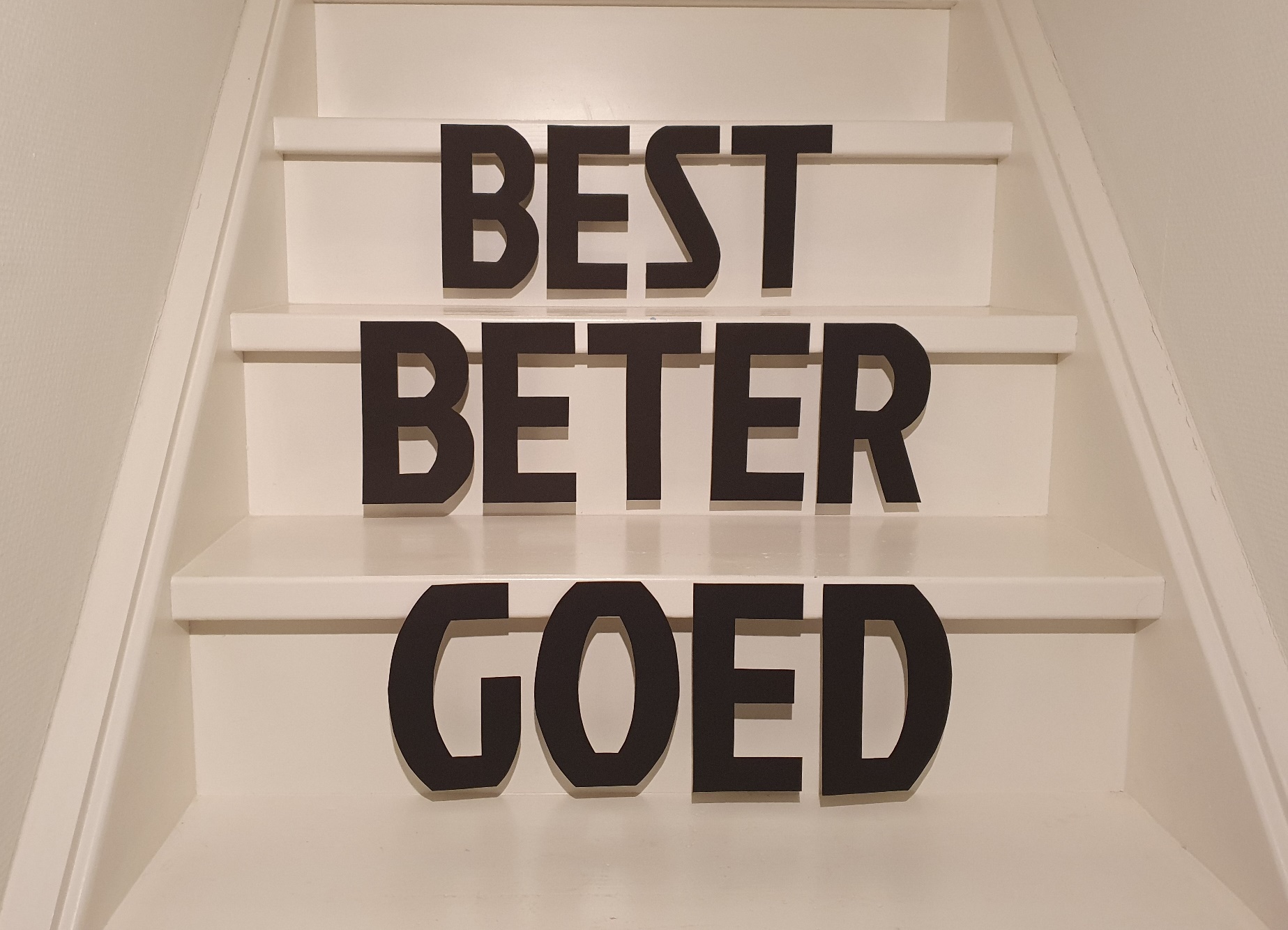WEST GERMANIC
Good, better, best
Linguistics
| 02-10-2020
The search term “Nederlands is mijn goedste vak” (Dutch is my goodest subject) produces 'about 514' results on Google. Apparently quite a lot of people find that statement funny, and I think that has to do with the fact that 'goedste' ('goodest') is so obviously an error. However, linguistics doesn't think in terms of 'language errors' (and neither do I, unless I'm reviewing the work of my students). So, the question is: why do we say good – better – best, and not good – gooder – goodest ?

The Dutch language – and languages that are related to it to a greater or lesser extent, like English – is quite regular, although that seems to feel that way to many people. This may be because the exceptions need more explanation and you therefore spend a disproportionate amount of time at school on the irregular forms. But if you look at the degrees of comparison (the positive, comparative and superlative: green - greener - greenest), then almost all words follow the rule: in both Dutch and English we put -er behind the positive degree to make it comparative and we put -st or -est behind it for the superlative form. In Dutch, we add an extra letter here and there, delete one or switch something to match spelling and pronunciation: vet – vetter – vetst, groot – grooter – grootst, lief – liever – liefst. But the endings -er and -st are the same in all these examples.
Unique exception
A common example of an exception to the rule is goed – beter – best. As far as I've been able to find, there are only five other irregular degrees of comparison in Dutch: with kwaad ('bad', as in 'from bad to worse'), ver ('far'), weinig ('little'), veel ('much' or 'many') and graag ('gladly'). I might miss one or two, but there won't be much more. That's not much, when you consider how many adjectives there are that you can make a comparative and superlative of. I don't remember how I came up with it, but I recently realized that goed – beter – best in English, Frisian and German are very similar: good – better – best, goed – better – bêst and gut – besser – best. This of course raises the question of what else happens in those languages with irregular degrees of comparison. The number of exceptions is roughly the same in each of them, but there are only two or three other words that are irregular in all four languages: besides goed – beter – best there are graag – liever – liefst and veel – meer – meest, of which the latter can be translated into English as both many and much. Both are clearly different words than veel (and folle and viel), just as gladly is really something completely different from graag/graach or gern. So that makes the list goed – beter – best something unique.
Proto-Germanic borrowing
What makes the list goed – beter – best slightly less unique is that Old Saxon, Old Norse and Gothic also have clearly related words. On the other hand, of course, this makes it extra special: already before the years 1500, 1100 and 700 respectively, more or less the same irregular degrees of comparison were used for goed in many parts of Europe. In fact, the Proto-Germanic root (the reconstructed ancestor word, so to speak) was already that irregular: goed derives from *gōda- and beter and best from *bat-, which itself also meant 'good'. So the list could very well have been something like bet – beter – best. The ancestor of goed had no comparative or superlative form itself; something like goed – goeder – goedst never existed. Instead, *gōda- borrowed from *bat- to complement itself, and this is how many Germanic languages ended up with something similar togoed – beter – best. That in itself is already quite amazing, if you ask me, but I think it's even more exceptional that over the centuries – as much as 21! – this has never been 'corrected'. And that while just about every person who has learned one of the Germanic languages concerned, either as a child or at a later age, has probably made the logical form goeder ('gooder') or goedst ('goodest'). How is it possible that the language standard, which deviates from the 'logical system', is so strong here?

Good, better, best in Dutch (The litteral translation of 'degrees of comparison' in Dutch is 'stairs of comparison', hence the picture.)
RegularityThe Dutch language – and languages that are related to it to a greater or lesser extent, like English – is quite regular, although that seems to feel that way to many people. This may be because the exceptions need more explanation and you therefore spend a disproportionate amount of time at school on the irregular forms. But if you look at the degrees of comparison (the positive, comparative and superlative: green - greener - greenest), then almost all words follow the rule: in both Dutch and English we put -er behind the positive degree to make it comparative and we put -st or -est behind it for the superlative form. In Dutch, we add an extra letter here and there, delete one or switch something to match spelling and pronunciation: vet – vetter – vetst, groot – gro
Unique exception
A common example of an exception to the rule is goed – beter – best. As far as I've been able to find, there are only five other irregular degrees of comparison in Dutch: with kwaad ('bad', as in 'from bad to worse'), ver ('far'), weinig ('little'), veel ('much' or 'many') and graag ('gladly'). I might miss one or two, but there won't be much more. That's not much, when you consider how many adjectives there are that you can make a comparative and superlative of. I don't remember how I came up with it, but I recently realized that goed – beter – best in English, Frisian and German are very similar: good – better – best, goed – better – bêst and gut – besser – best. This of course raises the question of what else happens in those languages with irregular degrees of comparison. The number of exceptions is roughly the same in each of them, but there are only two or three other words that are irregular in all four languages: besides goed – beter – best there are graag – liever – liefst and veel – meer – meest, of which the latter can be translated into English as both many and much. Both are clearly different words than veel (and folle and viel), just as gladly is really something completely different from graag/graach or gern. So that makes the list goed – beter – best something unique.
Proto-Germanic borrowing
What makes the list goed – beter – best slightly less unique is that Old Saxon, Old Norse and Gothic also have clearly related words. On the other hand, of course, this makes it extra special: already before the years 1500, 1100 and 700 respectively, more or less the same irregular degrees of comparison were used for goed in many parts of Europe. In fact, the Proto-Germanic root (the reconstructed ancestor word, so to speak) was already that irregular: goed derives from *gōda- and beter and best from *bat-, which itself also meant 'good'. So the list could very well have been something like bet – beter – best. The ancestor of goed had no comparative or superlative form itself; something like goed – goeder – goedst never existed. Instead, *gōda- borrowed from *bat- to complement itself, and this is how many Germanic languages ended up with something similar togoed – beter – best. That in itself is already quite amazing, if you ask me, but I think it's even more exceptional that over the centuries – as much as 21! – this has never been 'corrected'. And that while just about every person who has learned one of the Germanic languages concerned, either as a child or at a later age, has probably made the logical form goeder ('gooder') or goedst ('goodest'). How is it possible that the language standard, which deviates from the 'logical system', is so strong here?
WEST GERMANIC
In the West Germanic section, I regularly discuss a word that strikes me. I look at the meanings and forms of the word, and especially at where the word originates from. With that I compare the four West Germanic languages Dutch, English, Frisian and German, with the occasional inevitable trip across the fictional West Germanic border.
Sources
- NU Beter Engels
- Taaladvies.net
- Vaklokaal Duits
- Jetten, W. (z.d.) Frysk Grammatika Reader, via henkwolf.nl
- verbformen.de
- Komparation. (z.d.). In Wikipedia. Geraadpleegd op 26 september 2020.
- Etymologische woordenboeken: etymologiebank.nl, dwds.de, etymonline.com.
- Comparison (grammar). (z.d.) In Wikipedia. Geraadpleegd op 26 september 2020.
Image: own picture.
